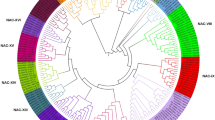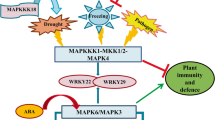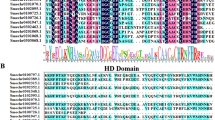Abstract
TCP transcription factors are important regulators of plant growth and proliferation processes, such as leaf morphogenesis, petal growth and development, and shoot branching. Here, an RNA-seq analysis revealed that an Acer palmatum class II TCP transcription factor was differentially expressed in ‘Jinlinghuangfeng’ and the mutant ‘Jinlinghuangyu,’ which exhibit different expression level of microRNA 319 (miR319). We isolated and functionally characterized this gene, which is named ApTCP2. ApTCP2 expression was detected in the root, stem, and leaf and was strongest in the leaf. ApTCP2 is deposited in the nucleus and exhibits no transcriptional activation ability in yeast. The overexpression of ApTCP2 and ApmTCP2 (an mRNA sequence with synonymous changes from ApTCP2 that exhibits reduced sequence complementarity to miR319) in Arabidopsis jaw-D plants (which overexpress miR319) rescued the leaf defects in these plants. In Arabidopsis, ApTCP2 and ApmTCP2 affected the flowering period, and leaf senescence was accelerated by high expression of ApTCP2 and ApmTCP2. The transcript levels of key jasmonic acid (JA) biosynthesis genes (LIPOXYGENASE [AtLOXs]; AtLOX2, AtLOX3, and AtLOX4) were increased in the transgenic lines. Our results reveal that ApTCP2 plays multiple roles, including modulating leaf morphogenesis, affecting flowering and positively regulating leaf senescence, via miR319, and these effects are at least partially achieved by influencing JA biosynthesis.








Similar content being viewed by others
References
Aguilar-Martinez JA, Poza-Carrion C, Cubas P (2007) Arabidopsis BRANCHED1 acts as an integrator of branching signals within axillary buds. Plant Cell 19:458–472. https://doi.org/10.1105/tpc.106.048934
Anders S, Huber W (2010) Differential expression analysis for sequence count data. Genome Biol 11:R106. https://doi.org/10.1186/gb-2010-11-10-r106
Andriankaja M, Dhondt S, De Bodt S, Vanhaeren H, Coppens F, De Milde L, Mühlenbock P, Skirycz A, Gonzalez N, Beemster GT, Inzé D (2012) Exit from proliferation during leaf development in Arabidopsis thaliana: a not-so-gradual process. Dev Cell 22:64–78. https://doi.org/10.1016/j.devcel.2011.11.011
Bar M, Ori N (2014) Leaf development and morphogenesis. Development 141:4219–4230. https://doi.org/10.1242/dev.106195
Bilsborough GD, Runions A, Barkoulas M, Jenkins HW, Hasson A, Galinha C, Laufs P, Hay A, Prusinkiewicz P, Tsiantis M (2011) Model for the regulation of Arabidopsis thaliana leaf margin development. Proc Natl Acad Sci USA 108:3424–3429. https://doi.org/10.1073/pnas.1015162108
Chitwood DH, Sinha NR (2014) Plant development: small RNAs and the metamorphosis of leaves. Curr Biol 24:R1087–R1089. https://doi.org/10.1016/j.cub.2014.10.013
Chitwood DH, Sinha NR (2016) Evolutionary and environmental forces sculpting leaf development. Curr Biol 26:297–306. https://doi.org/10.1016/j.cub.2016.02.033
Clough SJ, Bent AF (1999) Floral dip: a simplified method for Agrobacterium-mediated transformation of Arabidopsis thaliana. Plant J 16:735–743. https://doi.org/10.1046/j,1365-313x.1998.00343.x
Crawford BCW, Nath U, Carpenter R, Coen ES (2004) CINCINNATA controls both cell differentiation and growth in petal lobes and leaves of Antirrhinum. Plant Physiol 135:244–253. https://doi.org/10.1104/pp.103.036368
Curtis MD, Grossniklaus U (2003) A gateway cloning vector set for high-throughput functional analysis of genes in planta. Plant Physiol 133:462–469. https://doi.org/10.1104/pp.103.027979
Damerval C, Guilloux ML, Jager M, Charon C (2007) Diversity and evolution of CYCLOIDEA-like TCP genes in relation to flower development in Papaveraceae. Plant Physiol 143:759–772. https://doi.org/10.2307/40065431
Doebley J, Stec A, Hubbard L (1997) The evolution of apical dominance in maize. Nature 386:485–488. https://doi.org/10.1038/386485a0
Efroni I, Blum E, Goldshmidt A, Eshed Y (2008) A protracted and dynamic maturation schedule underlies Arabidopsis leaf development. Plant Cell 20:2293–2306. https://doi.org/10.1105/tpc.107.057521
Fouracre JP, Poethig RS (2016) The role of small RNAs in vegetative shoot development. Curr Opin Plant Biol 29:64–72. https://doi.org/10.1016/j.pbi.2015.11.006
Gion K, Suzuri R, Shikata M, Mitsuda N, Oshima Y, Koyama T, Ohme-Takagi M, Ohtsubo N, Tanaka Y (2011) Morphological changes of Rosa × hybrida by a chimeric repressor of Arabidopsis TCP3. Plant Biotechnol 28:149–152. https://doi.org/10.5511/plantbiotechnology.10.1214a
Giraud E, Ng S, Carrie C, Duncan O, Low J, Lee CP, Van Aken O, Millar AH, Murcha M, Whelan J (2010) TCP Transcription factors link the regulation of genes encoding mitochondrial proteins with the circadian clock in Arabidopsis thaliana. Plant Cell 22:3921–3934. https://doi.org/10.1105/tpc.110.074518
Grabherr MG, Haas BJ, Yassour M, Levin JZ, Thompson DA, Amit I, Adiconis X, Fan L, Raychowdhury R, Zeng QD, Chen ZH, Mauceli E, Hacohen N, Gnirke A, Rhind N, Palma F, Birren BW, Nusbaum C, Lindblad-Toh K, Friedman N, Regev A (2011) Full-length transcriptome assembly from RNA-Seq data without a reference genome. Nat Biotechnol 29:644–652. https://doi.org/10.1038/nbt.1883
He Y, Fukushige H, Hildebrand DF, Gan S (2002) Evidence supporting a role of jasmonic acid in Arabidopsis leaf senescence. Plant Physiol 128:876–884. https://doi.org/10.1104/pp.010843
Horiguchi G, Ferjani A, Fujikura U, Tsukaya H (2006) Coordination of cell proliferation and cell expansion in the control of leaf size in Arabidopsis thaliana. J Plant Res 119:37–42. https://doi.org/10.1007/s10265-005-0232-4
Kim JH, Lee BC, Kim JH, Sim GS, Lee DH, Lee KE, Yun YP, Pyo HB (2005) The isolation and antioxidative effects of vitexin from Acer palmatum. Arch Pharm Res 28:195. https://doi.org/10.1007/bf02977715
Kosugi S, Ohashi Y (1997) PCF1 and PCF2 specifically bind to cis elements in the rice proliferating cell nuclear antigen gene. Plant Cell 9:1607–1619. https://doi.org/10.2307/3870447
Koyama T, Furutani M, Tasaka M, Ohme-Takagi M (2007) TCP transcription factors control the morphology of shoot lateral organs via negative regulation of the expression of boundary-specific genes in Arabidopsis. Plant Cell 19:473–484. https://doi.org/10.1105/tpc.106.044792
Koyama T, Mitsuda N, Seki M, Shinozaki K, Ohmetakagi M (2010) TCP transcription factors regulate the activities of ASYMMETRIC LEAVES1 and miR164, as well as the auxin response, during differentiation of leaves in Arabidopsis. Plant Cell 22:3574–3588. https://doi.org/10.1105/tpc.110.075598
Koyama T, Ohme-Takagi M, Sato F (2011) Generation of serrated and wavy petals by inhibition of the activity of TCP transcription factors in Arabidopsis thaliana. Plant Signal Behav 6:697–699. https://doi.org/10.4161/psb.6.5.14979
Koyama T, Sato F, Ohme-Takagi M (2017) Roles of miR319 and TCP transcription factors in leaf development. Plant Physiol 175(2):874–885. https://doi.org/10.1104/pp.17.00732
Kumar S, Stecher G, Tamura K (2016) MEGA7: molecular evolutionary genetics analysis version 7.0 for bigger datasets. Mol Biol Evol 33(7):1870–1874. https://doi.org/10.1093/molbev/msw054
Larkin MA, Blackshields G, Brown NP, Chenna R, McGettigan PA, McWilliam H, Valentin F, Wallace IM, Wilm A, Lopez R, Thompson JD, Gibson TJ, Higgins DG (2007) Clustal W and Clustal X version 2.0. Bioinformatics 23:2947–2948. https://doi.org/10.1093/bioinformatics/btm404
Li ZY, Li B, Shen WH, Huang H, Dong AW (2012) TCP transcription factors interact with AS2 in the repression of class-I KNOX genes in Arabidopsis thaliana. Plant J 71:99–107. https://doi.org/10.1111/j.1365-313X.2012.04973.x
Li SS, Li QZ, Tang L, Wen J (2017) Pigment comparison and expression of chlorophyll metabolism genes in yellow and green Acer palmatum leaves. Can J Plant Sci. https://doi.org/10.1139/CJPS-2016-0307
Liu Y, Guan XY, Liu SN, Yang M, Ren JH, Guo M, Huang ZH, Zhang YW (2018) Genome-wide identification and analysis of TCP transcription factors involved in the formation of leafy head in Chinese cabbage. Int J Mol Sci 19:847. https://doi.org/10.3390/ijms19030847
Love MI, Huber W, Anders S (2014) Moderated estimation of fold change and dispersion for RNA-seq data with DESeq2. Genome Biol 15(12):550. https://doi.org/10.1186/s13059-014-0550-8
Luo D, Carpenter R, Vincent C, Copsey L, Coen E (1996) Origin of floral asymmetry in Antirrhinum. Nature 383:794–799. https://doi.org/10.1038/383794a0
Luo M, Gao Z, Li H, Li Q, Zhang CX, Xu WP, Song SR, Ma C, Wang S (2018) Selection of reference genes for miRNA qRT-PCR under abiotic stress in grapevine. Sci Rep 8:4444. https://doi.org/10.1038/s41598-018-22743-6
Ma XD, Ma JC, Fan D, Li CF, Jiang YZ, Luo KM (2016) Genome-wide identification of TCP family transcription factors from Populus euphratica and their involvement in leaf shape regulation. Sci Rep 6:32795. https://doi.org/10.1038/srep32795
Mao YF, Wu FJ, Yu X, Bai JJ, Zhong WL, He YK (2014) microRNA319a-targeted Brassica rapa ssp. pekinensis TCP genes modulate head shape in Chinese Cabbage by differential cell division arrest in leaf regions. Plant Physiol 164:710–720. https://doi.org/10.1104/pp.113.228007
Martín-Trillo M, Cubas P (2010) TCP genes: a family snapshot ten years later. Trends Plant Sci 15:31–39. https://doi.org/10.1016/j.tplants.2009.11.003
Mecchia MA, Debernardi JM, Rodriguez RE, Schommer C, Palatnik JF (2013) MicroRNA miR396 and RDR6 synergistically regulate leaf development. Mech Develop 130:2–13. https://doi.org/10.1016/j.mod.2012.07.005
Nag A, King S, Jack T (2009) miR319a targeting of TCP4 is critical for petal growth and development in Arabidopsis. Proc Natl Acad Sci USA 106:22534–22539. https://doi.org/10.1073/pnas.0908718106
Narumi T, Aida R, Koyama T, Yamaguchi H, Sasaki K, Shikata M, Nakayama M, Ohme-Takagi M, Ohtsubo N (2011) Arabidopsis chimeric TCP3 repressor produces novel floral traits in Torenia fournieri and Chrysanthemum morifolium. Plant Biotechnol 28:131–140. https://doi.org/10.5511/plantbiotechnology.11.0121a
Nath U, Crawford BC, Carpenter R, Coen E (2003) Genetic control of surface curvature. Science 299:1404–1407. https://doi.org/10.1126/science.1079354
Navaud O, Dabos P, Carnus E, Tremousaygue D, Hervé C (2007) TCP transcription factors predate the emergence of land plants. J Mol Evol 65:23–33. https://doi.org/10.1007/s00239-006-0174-z
Nikovics K, Blein T, Peaucelle A, Ishida T, Morin H, Aida M, Laufs P (2006) The balance between the MIR164A and CUC2 genes controls leaf margin serration in Arabidopsis. Plant Cell 18:2929–2945. https://doi.org/10.1105/tpc.106.045617
Oh SA, Sang YL, Chung IK, Lee CH, Hong GN (1996) A senescence-associated gene of Arabidopsis thaliana is distinctively regulated during natural and artificially induced leaf senescence. Plant Mol Biol 30:739–754. https://doi.org/10.1007/BF00019008
Ori N, Cohen AR, Etzioni A, Brand A, Yanai O, Shleizer S, Menda N, Amsellem Z, Efroni I, Pekker I (2007) Regulation of LANCEOLATE by miR319 is required for compound-leaf development in tomato. Nat Genet 39:787–791. https://doi.org/10.1038/nature01958
Palatnik JF, Allen E, Wu X, Schommer C, Schwab R, Carrington JC, Weigel D (2003) Control of leaf morphogenesis by microRNAs. Nature 425:257. https://doi.org/10.1038/nature01958
Rodriguez RE, Schommer C, Palatnik JF (2016) Control of cell proliferation by microRNAs in plants. Curr Opin Plant Biol 34:68–76. https://doi.org/10.1016/j.pbi.2016.10.003
Rubio-Somoza I, Zhou CM, Confraria A, Martinho C, von Born P, Baena-Gonzalez E, Wang JW, Weigel D (2014) Temporal control of leaf complexity by miRNA-regulated licensing of protein complexes. Curr Biol 24:2714–2719. https://doi.org/10.1016/j.cub.2014.09.058
Sasaki K, Yamaguchi H, Kasajima I, Narumi T, Ohtsubo N (2016) Generation of novel floral traits using a combination of floral organ-specific promoters and a chimeric repressor in Torenia fournieri Lind. Plant Cell Physiol 57(6):1319–1331. https://doi.org/10.1093/pcp/pcw081
Schommer C, Palatnik JF, Aggarwal P, Chételat A, Cubas P, Farmer EE, Nath U, Weigel D (2008) Control of jasmonate biosynthesis and senescence by miR319 targets. PLoS Biol 6:e230. https://doi.org/10.1371/journal.pbio.0060230
Takeda T, Suwa Y, Suzuki M, Kitano H, Ueguchi-Tanaka M, Ashikari M, Matsuoka M, Ueguchi C (2003) The OsTB1 gene negatively regulates lateral branching in rice. Plant J 33:513–520. https://doi.org/10.1046/j.1365-313X.2003.01648.x
Tang Y, Zhao CY, Tan ST, Xue HW (2016) Arabidopsis type II phosphatidylinositol 4-Kinase PI4Kγ5 regulates auxin biosynthesis and leaf margin development through interacting with membrane-bound transcription factor ANAC078. PLoS Genet 12:e1006252. https://doi.org/10.1371/journal.pgen.1006252
Wang HF, Wang HW, Liu R, Xu YT, Lu ZC, Zhou CE (2018) Genome-wide identification of TCP family transcription factors in Medicago truncatula reveals significant roles of miR319-targeted TCPs in nodule development. Front Plant Sci 9:774. https://doi.org/10.3389/fpls.2018.00774
Wu ZJ, Wang WL, Zhuang J (2017) TCP family genes control leaf development and its responses to hormonal stimuli in tea plant [Camellia sinensis (L.) O. Kuntze]. Plant Growth Regul 83:43–53. https://doi.org/10.1007/s10725-017-0282-3
Yan J, Chia JC, Sheng H, Jung HI, Zavodna TO, Zhang L, Huang R, Jiao C, Craft EJ, Fei Z, Kochian LV (2017) Arabidopsis pollen fertility requires the transcription factors CIT1 and SPL7 that regulate copper delivery to anthers and Jasmonic acid synthesis. Plant Cell 29:3012–3029. https://doi.org/10.1105/tpc.17.00363
Yasunori I, Hirokazu T (2015) Behavior of leaf meristems and their modification. Front Plant Sci 6:1060. https://doi.org/10.3389/fpls.2015.01060
Zhou F, Lin Q, Zhu L, Ren Y, Zhou K, Shabek N, Wu F, Mao H, Dong W, Gan L, Ma W, Gao H, Chen J, Yang C, Wang D, Tan J, Zhang X, Guo X, Wang J, Jiang L, Liu X, Chen W, Chu J, Yan C, Ueno K, Ito S, Asami T, Cheng Z, Wang J, Lei C, Zhai H, Wu C, Wang H, Zheng N, Wan J (2013) Corrigendum: D14-SCF(D3)-dependent degradation of D53 regulates strigolactone signalling. Nature 504(7480):406–410. https://doi.org/10.1038/nature16537
Zhu L, Ma QY, Li SS, Wen J, Yan KY, Li QZ (2020) Reference gene selection for quantitative real-time PCR analyses of Acer palmatum under abiotic stress. Phyton-Int J Exp Bot. https://doi.org/10.32604/phyton.2020.09259
Acknowledgements
This work was supported by the National Natural Science Foundation of China (31700628), the Natural Science Foundation of Jiangsu Province (BK20170602), and the Jiangsu Agricultural Science and Technology Innovation Fund (CX(17)1004).
Author information
Authors and Affiliations
Contributions
LZ and QL conceived and designed the research; LZ, QM, and SL conducted the experiments; JW and KY analyzed the data; and LZ wrote the manuscript. All authors read and approved the final manuscript.
Corresponding author
Ethics declarations
Conflict of interest
The authors declare that they have no conflicts of interest.
Additional information
Handling Editor: James Campanella.
Publisher's Note
Springer Nature remains neutral with regard to jurisdictional claims in published maps and institutional affiliations.
Supplementary Information
Below is the link to the electronic supplementary material.
Rights and permissions
About this article
Cite this article
Zhu, L., Li, S., Ma, Q. et al. The Acer palmatum TCP Transcription Factor ApTCP2 Controls Leaf Morphogenesis, Accelerates Senescence, and Affects Flowering via miR319 in Arabidopsis thaliana. J Plant Growth Regul 41, 244–256 (2022). https://doi.org/10.1007/s00344-021-10299-1
Received:
Accepted:
Published:
Issue Date:
DOI: https://doi.org/10.1007/s00344-021-10299-1




